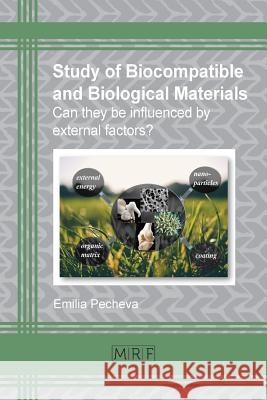Study of biocompatible and biological materials: Can they be influenced by external factors? » książka
Study of biocompatible and biological materials: Can they be influenced by external factors?
ISBN-13: 9781945291241 / Angielski / Miękka / 2017 / 230 str.
Study of biocompatible and biological materials: Can they be influenced by external factors?
ISBN-13: 9781945291241 / Angielski / Miękka / 2017 / 230 str.
(netto: 508,20 VAT: 5%)
Najniższa cena z 30 dni: 533,61
ok. 16-18 dni roboczych
Bez gwarancji dostawy przed świętami
Darmowa dostawa!
The book gives an overview on biomineralization, biological, biocompatible and biomimetic materials. It reveals the use of biomaterials alone or in composites, how their performance can be improved by tailoring their surface properties by external factors and how standard surface modification techniques can be applied in the area of biomaterials to beneficially influence their growth on surfaces.
Important in studying of biomineralization is the study of the surface and chapter 2 explores typical techniques for surface characterization and shows how these techniques can be modified to serve specific needs in the study of biomaterials. Chapters 3 and 4 reveal factors that can be used to influence the growth of the biomaterial hydroxyapatite (the main inorganic constituent in mammal bones and teeth), namely laser energy, organic matrix and incorporation of minor amount of nanoparticles into the hydroxyapatite matrix. Proteins are also used to modulate the cellular interactions with the hydroxyapatite.
The following three chapters (5, 6 and 7) are devoted to an example of the pathological mineralization, namely the formation of bacterial films on teeth and soft tissues in the mouth and how they can be removed to achieve better oral health.
The book gives an overview on biomineralization, biological, biocompatible and biomimetic materials. It reveals the use of biomaterials alone or in composites, how their performance can be improved by tailoring their surface properties by external factors and how standard surface modification techniques can be applied in the area of biomaterials to beneficially influence their growth on surfaces.
Important in studying of biomineralization is the study of the surface and chapter 2 explores typical techniques for surface characterization and shows how these techniques can be modified to serve specific needs in the study of biomaterials. Chapters 3 and 4 reveal factors that can be used to influence the growth of the biomaterial hydroxyapatite (the main inorganic constituent in mammal bones and teeth), namely laser energy, organic matrix and incorporation of minor amount of nanoparticles into the hydroxyapatite matrix. Proteins are also used to modulate the cellular interactions with the hydroxyapatite.
The following three chapters (5, 6 and 7) are devoted to an example of the pathological mineralization, namely the formation of bacterial films on teeth and soft tissues in the mouth and how they can be removed to achieve better oral health.











